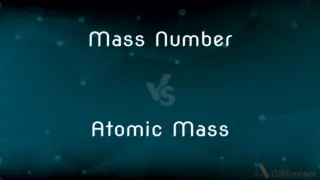MPG vs. MP4 — What's the Difference?
By Tayyaba Rehman — Published on December 10, 2023
MPG is a file format for compressed video, while MP4 is a multimedia container format supporting video, audio, and text.

Difference Between MPG and MP4
Table of Contents
ADVERTISEMENT
Key Differences
MPG is a common file extension used for files that store compressed video and audio data. In contrast, MP4 is a more versatile multimedia container format that can hold video, audio, images, and text. Both MPG and MP4 are associated with the moving picture experts group that developed them.
While MPG typically refers to the MPEG-1 or MPEG-2 compression methods, MP4 is associated with the newer MPEG-4 compression. These distinctions between MPG and MP4 lead to differences in compression, quality, and file size. MPG generally has a larger file size than MP4, given the same video quality.
MPG, in its original design, was developed for early digital platforms and CD-ROM video content. On the other hand, MP4 was designed considering modern digital needs, supporting advanced features like 3D content, menus, and user interactivity. Both MPG and MP4 are supported by a broad range of devices and software, but MP4's versatility gives it an edge in contemporary digital environments.
In terms of compatibility, while both MPG and MP4 have their own strengths, MP4 stands out for being widely accepted across various devices, including smartphones, tablets, and televisions. MPG, while still prevalent, is often associated with older systems and technologies.
Even though MPG and MP4 may seem similar due to their origins and their roles in video storage and playback, their functionalities and applications are quite distinct. While MPG focuses mainly on video and audio compression, MP4's broader container format capabilities make it suitable for a wider range of multimedia applications.
ADVERTISEMENT
Comparison Chart
Origin
Developed for early digital platforms and CD-ROM
Designed for modern digital needs with advanced features
Compression
Typically uses MPEG-1 or MPEG-2 compression
Uses MPEG-4 compression
File Size
Generally larger for the same video quality
Smaller, more efficient compression
Content Type
Mainly compressed video and audio
Can hold video, audio, images, and text
Compatibility
More common with older systems
Widely accepted across various modern devices, including smartphones, tablets, and TVs
Compare with Definitions
MPG
MPG stands for Moving Picture Experts Group.
The MPG standard revolutionized video and audio compression in its time.
MP4
MP4 can store video, audio, images, and text.
The lecture was recorded in an MP4 file, containing both video and slides.
MPG
MPG typically uses MPEG-1 or MPEG-2 compression methods.
Older DVDs often use MPG format with MPEG-2 compression for video playback.
MP4
MP4 uses the MPEG-4 compression standard.
She compressed the movie using MPEG-4, resulting in a smaller MP4 file.
MPG
MPG formats are commonly used for TV broadcasts and DVDs.
The broadcast was in MPG format, ensuring compatibility with many television sets.
MP4
MP4 is a digital multimedia container format.
I prefer saving videos in MP4 format because of its versatility.
MPG
MPG is a file extension for compressed video and audio files.
She sent me a video in an MPG format, and it took a while to download.
MP4
MP4 is widely supported across devices and platforms.
My smartphone, tablet, and TV all support MP4 playback seamlessly.
MPG
MPG files are associated with older multimedia technologies.
I found some old MPG files on a CD from the early 2000s.
MP4
MP4 files support advanced features and user interactivity.
The MP4 video had interactive buttons to jump between sections.
Common Curiosities
What does MPG stand for?
MPG stands for Moving Picture Experts Group.
What type of files does MP4 support?
MP4 supports video, audio, images, and text within its container format.
Are MP4 files generally smaller than MPG files?
Yes, given the same video quality, MP4 files are generally smaller due to more efficient compression.
Is MPG a compression method or a file format?
MPG is a file format that typically uses MPEG-1 or MPEG-2 compression methods.
Why is MP4 more commonly used in today's digital environment?
MP4's versatility, efficient compression, and broad device compatibility make it more commonly used.
Can I convert an MPG file to MP4?
Yes, various software tools allow you to convert MPG files to MP4.
Can MPG files be played on modern devices?
Yes, many modern devices still support MPG playback, but MP4 is more widely accepted.
What compression does MP4 use?
MP4 primarily uses the MPEG-4 compression standard.
Is the quality of MPG and MP4 videos the same?
The perceived quality can vary based on compression settings, but MP4 generally offers more efficient compression with maintained quality.
Which file format is more versatile, MPG or MP4?
MP4 is more versatile, capable of holding various types of media content.
Which format is better for interactive content, MPG or MP4?
MP4 is better suited for interactive content due to its container format capabilities.
Are MPG files considered outdated?
While MPG files are associated with older technologies, they are still in use, especially in specific contexts like TV broadcasts.
Why might someone choose MPG over MP4?
Someone might choose MPG for compatibility reasons with older systems or specific broadcast requirements.
Are there any limitations to the MP4 format?
While MP4 is versatile, its performance can depend on codec support and the specifications of the playback device.
Can I embed subtitles in an MP4 file?
Yes, MP4 allows for embedding text, which includes subtitles.
Share Your Discovery

Previous Comparison
Mass Number vs. Atomic Mass
Next Comparison
Supplements vs. VitaminsAuthor Spotlight
Written by
Tayyaba RehmanTayyaba Rehman is a distinguished writer, currently serving as a primary contributor to askdifference.com. As a researcher in semantics and etymology, Tayyaba's passion for the complexity of languages and their distinctions has found a perfect home on the platform. Tayyaba delves into the intricacies of language, distinguishing between commonly confused words and phrases, thereby providing clarity for readers worldwide.












































